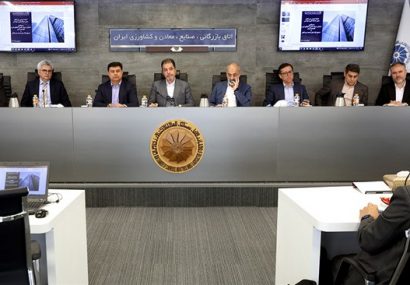Iran, Azerbaijan Poised for Stronger Economic Cooperation in Engineering,Construction Sectors
TEHRAN (Iran News) The meeting, chaired by Deputy Presidents of the Iran Chamber of Commerce, Peyman Bagheri and Ghadir Ghiafeh, reviewed the upcoming visit of Iranian President Masoud Pezeshkian to Azerbaijan. The President will be accompanied by a high-ranking economic delegation, including over 120 private sector representatives and four provincial governors from northwestern Iran. The visit, scheduled for April 27, aims to open a new chapter in Iran-Azerbaijan economic relations.
A major highlight of the meeting was the announcement of an international workshop on the export of engineering services, co-organized by Iran’s Organization for Investment and Economic and Technical Assistance and the OPEC Fund for International Development. Scheduled for May 13–14, the workshop will cover key areas such as project identification for financing through OPEC, and training Iranian consulting firms in drafting competitive technical and financial proposals.
Amir-Reza Ahmadi-Motlagh, an advisor to the commission, noted that the workshop will also help Iranian contractors enhance their ability to compete in international tenders. Participants will gain insight into how the OPEC Fund evaluates and scores consultants and contractors—an essential step in securing future international projects.
Behrouz Poursoliman, Deputy President of the Ardabil Chamber and Iran-Azerbaijan Joint Chamber, pointed out that while Iran has a historical trade relationship with Azerbaijan, Iranian firms currently have a minor role in Azerbaijan’s engineering market. Most reconstruction projects in the Karabakh region are dominated by Turkish and Pakistani firms. He stressed that Iranian companies have significant potential to contribute, especially in rebuilding efforts in liberated regions of Azerbaijan.
Ghadir Ghiafeh emphasized Azerbaijan’s vast opportunities, particularly in oil and gas sectors, where global giants like Shell are active. He urged Iranian firms to build their international networks and financial strength to win future bids.
Peyman Bagheri highlighted past engineering collaborations between the two countries, such as Iranian companies’ work in electricity transmission during the late 2000s. He noted that political issues have overshadowed these achievements but expressed optimism that the President’s visit could help resolve longstanding barriers.
He called for strategic private-sector involvement in the upcoming delegation, suggesting that Iranian businesses prepare specific, written proposals to present during B2B meetings in Baku.
Ali Naqavi, head of the commission, discussed potential scenarios if sanctions on Iran are lifted following negotiations with the United States. Citing a study, he estimated that if Iran is allowed to sell 3 million barrels of oil per day at an average price of $75 per barrel, annual revenues could reach $82 billion. However, fully realizing Iran’s development goals—including expanding power generation, high-speed railways, airports, and 5G infrastructure—would require an estimated $270 billion over a decade.
Several commission members highlighted systemic issues, including lack of reliable data and poor strategic planning. Soheil Al-Rasoul, Deputy President of the Commission, stressed the need for a robust national database to support evidence-based policymaking and reduce uncertainty for private investors.
Reza Hajikarim, President of Iran’s Water Industry Federation, warned that economic development must not ignore the country’s water crisis. He added that even under current legislation, progress is possible if regulators and policymakers align.
Other experts, including Alireza Moghaddaszadeh and Mohammad Halvaei, emphasized the need to define new financial models and support mechanisms for infrastructure projects. They called for reforms in Iran’s economic governance to strengthen the role of the private sector, and criticized the government’s lack of attention to long-term vision documents and the competitive challenges posed by semi-state-owned enterprises.
In the final part of the meeting, Isa Mansouri, head of the Iran Chamber’s Research Center, advocated for transforming the center’s role from merely producing academic studies to developing actionable policy frameworks. He emphasized the need for a new cooperation framework between the Commission and the Research Center, suggesting that research projects be aligned with national development goals and converted into practical legislation.
Mansouri identified engineering services and construction as key sectors for national development, especially in logistics, and outlined four scenarios for Iran-U.S. negotiations, stressing the importance of regional economic development using international experience.
The session concluded with a proposal to define large-scale national projects in sectors such as oil, gas, petrochemicals, digital economy, logistics, and development of the Makran region.
- source : irna






























